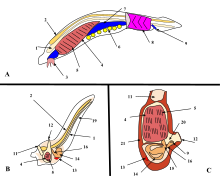Alexander Kovalevsky | |
|---|---|
 Alexander Kovalevsky | |
| Born | 7 November 1840 Vārkava, Vitebsk Governorate, Russian Empire |
| Died | 1901 St. Petersburg, Russian Empire |
| Nationality | Russian Empire |
| Alma mater | University of Heidelberg |
| Known for | Gastrulation |
| Scientific career | |
| Fields | Embryology |
Alexander Onufrievich Kovalevsky (Russian: Алекса́ндр Ону́фриевич Ковале́вский; 7 November 1840 – 1901) was a Russian embryologist, who studied medicine at the University of Heidelberg and became professor at the University of St Petersburg.[1][2][3][4] He was the brother of the paleontologist Vladimir Kovalevsky, and the brother-in-law of the mathematician Sofya Kovalevskaya.
YouTube Encyclopedic
-
1/3Views:3 1433 248509
-
Top 10 Greatest Russian/Soviet Mathematicians
-
Russian mathematicians
-
Three questions to Aydan Bulut-Karslioglu
Transcription
Discoveries

Kowalevsky's family belonged to Ukrainian nobility.
He showed that all animals go through a period of gastrulation.[1][2][3][4]
Kovalevsky discovered that tunicates are not molluscs, but that their larval stage has a notochord and pharyngeal slits, like vertebrates. Further, these structures develop from the same germ layers in the embryo as the equivalent structures in vertebrates, so he argued that the tunicates should be grouped with the vertebrates as chordates. 19th-century zoology thus converted embryology into an evolutionary science, connecting phylogeny with homologies between the germ layers of embryos, foreshadowing evolutionary developmental biology.[5]

Honors
He was elected on the 1st of May 1884 a Foreign Member of the Linnean Society of London.[6] The St. Petersburg Society of Naturalists annually awards the A.O. Kovalevsky Medal.
Bibliography
- Kowalevsky, A (1901). "Les Hedylidés, étude anatomique". Zapiski Imperatorskoi Akademii Nauk. 12: 1–32.
References
- ^ a b Ereskovsky, Alexander (2012). "Introduction to the Kowalevsky medal issue" (PDF). Evolution & Development. 14 (1): 1–2. doi:10.1111/j.1525-142X.2011.00516.x. PMID 23016968. S2CID 46420506.
- ^ a b Fokin, Sergei I. (2012). "Life of Alexander Onufrievich Kowalevsky (1840–1901)". Evolution & Development. 14 (1): 3–8. doi:10.1111/j.1525-142X.2011.00517.x. PMID 23016969. S2CID 205674995.
- ^ a b Haas, L F (May 1999). "Alexander Onufrievich Kovalevsky (1840-1901)". J. Neurol. Neurosurg. Psychiatry. 66 (5): 680. doi:10.1136/jnnp.66.5.680. PMC 1736354. PMID 10209188.
- ^ a b Kyle, R A; Shampo M A (Sep 1982). "Alexander O. Kovalevsky". JAMA. 248 (11): 1336. doi:10.1001/jama.248.11.1336. PMID 7050433.
- ^ Gilbert, Scott F. (2003). "The morphogenesis of evolutionary developmental biology" (PDF). International Journal of Developmental Biology. 47 (7–8): 467–477. PMID 14756322.
- ^ Proceedings of the Linnean Society of London (Session 1883–1884). 1880. p. 11.
